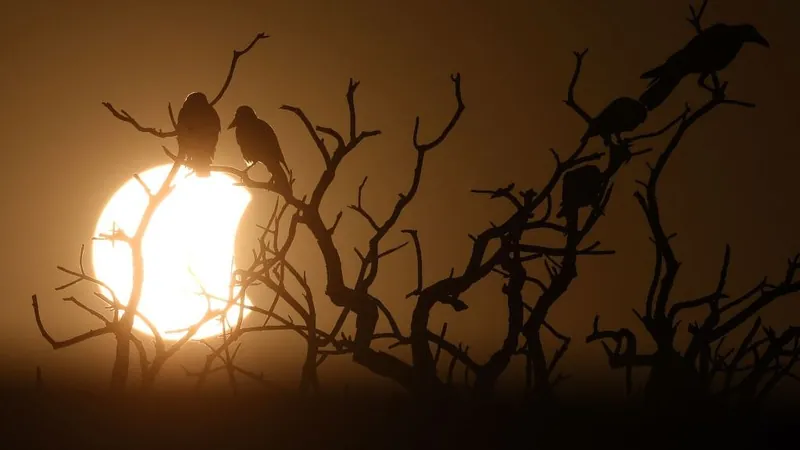
Birds Fall Silent: The Astonishing Impact of the 2024 Total Solar Eclipse
2025-04-09
Author: John Tan
As millions across North America marveled at the breathtaking total solar eclipse of 2024, an unexpected phenomenon unfolded in the avian world.
Researchers, equipped with 344 cutting-edge acoustic monitoring devices known as Haikuboxes, captured intriguing shifts in bird vocalizations during this celestial event. A collaboration between Loggerhead Instruments, Inc. and the Cornell Lab of Ornithology revealed that the very essence of bird behavior dramatically changed during the eclipse.
A Symphony of Silence: The Birds Speak!
"For ages, people have claimed that birds become eerily silent or act differently during a total solar eclipse," stated David Mann, the study's lead author. "Our findings, however, provide solid proof that birds, indeed, quiet down during totality, particularly when the level of darkness intensifies."
The study relied on invaluable insights from citizen scientists who installed these acoustic devices throughout the U.S., enabling a unique perspective into wildlife behavior. Employing artificial intelligence, researchers could analyze vast amounts of data without the biases of human observation.
Diverse Reactions across Species and Regions
Mann noted that the team discovered astonishing variances in responses among different bird species and geographic locations. For example, Black-capped Chickadees in New York remained hushed long after totality, while their counterparts in Vermont burst into song during the eclipse. Meanwhile, American Robins in Kentucky continued their melodious serenades, contrasting sharply with the Pine Siskins in Maine, who went completely quiet.
"The variety of reactions was nothing short of captivating," Mann remarked. "Despite a deep dive into factors like temperature and wind speed, we found no clear connection to vocalization changes, hinting that the sudden engulfment in darkness was the real catalyst for these behavioral shifts."
Unlocking Secrets of the Natural World
This groundbreaking research underscores the power of community science, showcasing how technology can yield insights into animal behavior with minimal disruption. Haikuboxes have proven instrumental in collecting extensive data, revealing startling patterns that traditional studies might overlook.
Mann concluded, "Our research opens up new avenues for understanding how light pollution and sudden shifts in light levels affect bird behavior. This fusion of community science with innovative technology allows us to uncover awe-inspiring truths about wildlife, paving the way for future comprehensive studies across the continent."



 Brasil (PT)
Brasil (PT)
 Canada (EN)
Canada (EN)
 Chile (ES)
Chile (ES)
 Česko (CS)
Česko (CS)
 대한민국 (KO)
대한민국 (KO)
 España (ES)
España (ES)
 France (FR)
France (FR)
 Hong Kong (EN)
Hong Kong (EN)
 Italia (IT)
Italia (IT)
 日本 (JA)
日本 (JA)
 Magyarország (HU)
Magyarország (HU)
 Norge (NO)
Norge (NO)
 Polska (PL)
Polska (PL)
 Schweiz (DE)
Schweiz (DE)
 Singapore (EN)
Singapore (EN)
 Sverige (SV)
Sverige (SV)
 Suomi (FI)
Suomi (FI)
 Türkiye (TR)
Türkiye (TR)
 الإمارات العربية المتحدة (AR)
الإمارات العربية المتحدة (AR)